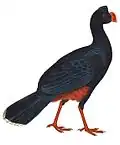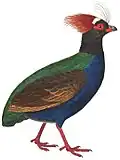| Synoicus | |
|---|---|
 | |
| S. ypsilophorus | |
 | |
| S. chinensis | |
| Scientific classification | |
| Domain: | Eukaryota |
| Kingdom: | Animalia |
| Phylum: | Chordata |
| Class: | Aves |
| Order: | Galliformes |
| Family: | Phasianidae |
| Tribe: | Coturnicini |
| Genus: | Synoicus Gould, 1843 |
| Type species | |
| Perdix australis[1] (Latham) | |
| Species | |
|
See text | |
| Synonyms | |
Synoicus is a genus of 4 species of Old World quail.[2]
The species in the genus are distributed throughout sub-Saharan Africa, tropical Asia, and Australasia. Two of the four species in the genus were originally classified in Excalfactoria, one was classified in Anurophasis, and one was classified in Coturnix. Several phylogenetic studies found these species to all group together into a single genus, which was followed by the International Ornithological Congress in 2021.[2][3][4][5]
Species
| Species | ||
|---|---|---|
| Common and binomial names | Image | Range |
| Brown quail (Synoicus ypsilophorus) |  |
Mainland Australia, Tasmania and Papua New Guinea; introduced to New Zealand and Fiji |
| Snow Mountain quail (Synoicus monorthonyx) |  |
Snow and Star Mountains, West Papua (Indonesia) and Papua New Guinea |
| King quail (Synoicus chinensis) | .jpg.webp) |
India and Sri Lanka east to Taiwan, south to eastern Australia |
| Blue quail (Synoicus adansonii) |  |
Sub-Saharan Africa, from Zambia north to Ethiopia, and west to Sierra Leone |
References
- ↑ "Report". Integrated Taxonomic Information System.
- 1 2 "Taxonomic Updates – IOC World Bird List". Retrieved 2021-07-14.
- ↑ Seabrook-Davison, Mark; Huynen, Leon; Lambert, David M.; Brunton, Dianne H. (2009-07-28). "Ancient DNA Resolves Identity and Phylogeny of New Zealand's Extinct and Living Quail (Coturnix sp.)". PLOS ONE. 4 (7): e6400. Bibcode:2009PLoSO...4.6400S. doi:10.1371/journal.pone.0006400. ISSN 1932-6203. PMC 2712072. PMID 19636374.
- ↑ Hosner, Peter A.; Tobias, Joseph A.; Braun, Edward L.; Kimball, Rebecca T. (2017-05-17). "How do seemingly non-vagile clades accomplish trans-marine dispersal? Trait and dispersal evolution in the landfowl (Aves: Galliformes)". Proceedings of the Royal Society B: Biological Sciences. 284 (1854): 20170210. doi:10.1098/rspb.2017.0210. PMC 5443944. PMID 28469029.
- ↑ Kimball, Rebecca T.; Mary, Colette M. St; Braun, Edward L. (2011-05-02). "A Macroevolutionary Perspective on Multiple Sexual Traits in the Phasianidae (Galliformes)". International Journal of Evolutionary Biology. 2011: 423938. doi:10.4061/2011/423938. PMC 3119463. PMID 21716735.
This article is issued from Wikipedia. The text is licensed under Creative Commons - Attribution - Sharealike. Additional terms may apply for the media files.


